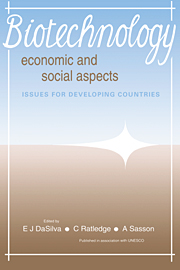Book contents
- Frontmatter
- Contents
- List of contributors
- Preface
- 1 Biotechnology: the socio-economic revolution? A synoptic view of the world status of biotechnology
- 2 Bioethanol production: economic and social considerations in failures and successes
- 3 Biofertilizers: agronomic and environmental impacts and economics
- 4 Microalgal biotechnology: is it an economic success?
- 5 Production of useful biochemicals by higher-plant cell cultures: biotechnological and economic aspects
- 6 Mushroom production – an economic measure in maintenance of food security
- 7 The economic viability of Single Cell Protein (SCP) production in the twenty-first century
- 8 The impact of biotechnology on international commodity trade
- 9 Biotechnology: socio-economic considerations, intercultural perspectives and international viewpoints
- 10 Joint microbial biotechnological ventures in developing countries: social promises and economic considerations
- 11 The economic and social implications of gene technology to developing countries
- 12 Making biotechnology appropriate – and environmentally sound
- 13 Information support for research and development in biotechnological applications
- 14 The effects of emerging biotechnologies on plant and animal agriculture – a viewpoint
- Index
11 - The economic and social implications of gene technology to developing countries
Published online by Cambridge University Press: 04 August 2010
- Frontmatter
- Contents
- List of contributors
- Preface
- 1 Biotechnology: the socio-economic revolution? A synoptic view of the world status of biotechnology
- 2 Bioethanol production: economic and social considerations in failures and successes
- 3 Biofertilizers: agronomic and environmental impacts and economics
- 4 Microalgal biotechnology: is it an economic success?
- 5 Production of useful biochemicals by higher-plant cell cultures: biotechnological and economic aspects
- 6 Mushroom production – an economic measure in maintenance of food security
- 7 The economic viability of Single Cell Protein (SCP) production in the twenty-first century
- 8 The impact of biotechnology on international commodity trade
- 9 Biotechnology: socio-economic considerations, intercultural perspectives and international viewpoints
- 10 Joint microbial biotechnological ventures in developing countries: social promises and economic considerations
- 11 The economic and social implications of gene technology to developing countries
- 12 Making biotechnology appropriate – and environmentally sound
- 13 Information support for research and development in biotechnological applications
- 14 The effects of emerging biotechnologies on plant and animal agriculture – a viewpoint
- Index
Summary
Introduction
The spectacular advances in molecular and cell biology that have fuelled the Biotechnology Revolution in industrially advanced countries can without doubt also have an enormous effect on public health, agriculture and industrial development in developing countries. There is, of course, a continuum of what is defined as biotechnology, ranging from the traditional applications of microbial fermentation to food preservation, mushroom culture, cheese making and beer production, to intricate genetic strategies to design and produce new macromolecules with new pharmacological or enzymatic activities.
For what would seem to be purely practical reasons, the most successful programmes initiated by developed countries and international organizations have concentrated on the ‘low’ end of biotechnology – that is, the older, traditional and proven technologies – as instruments for the improvement of the health, the standard of living and economic conditions of the Third World.
In order that even these basic technologies will positively influence the economics and social conditions of a given region, its is primarily a matter of creating the environment suitable for their effective application and commercial development. This means facilitating local entrepreneurism, creating the availability of investment capital, strengthening and updating the educational system (which more often than not is usually critical), and redesigning government bureaucracies so that they help rather than hinder the application of technology, etc. The current catchword is ‘infrastructure’. Without it, even the best technology would flounder helplessly and benefit no-one.
- Type
- Chapter
- Information
- Biotechnology: Economic and Social AspectsIssues for Developing Countries, pp. 266 - 283Publisher: Cambridge University PressPrint publication year: 1992

